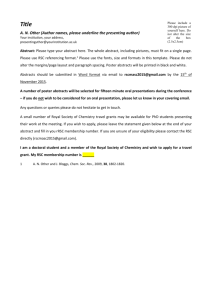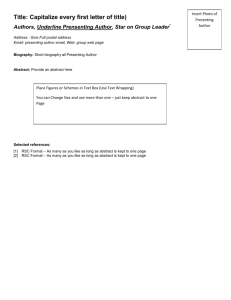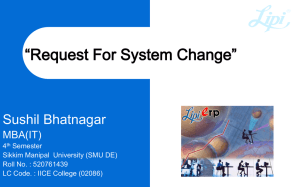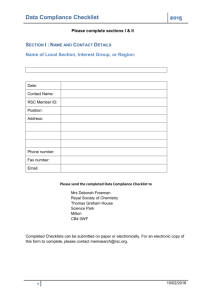Reference Assessment Plan
advertisement
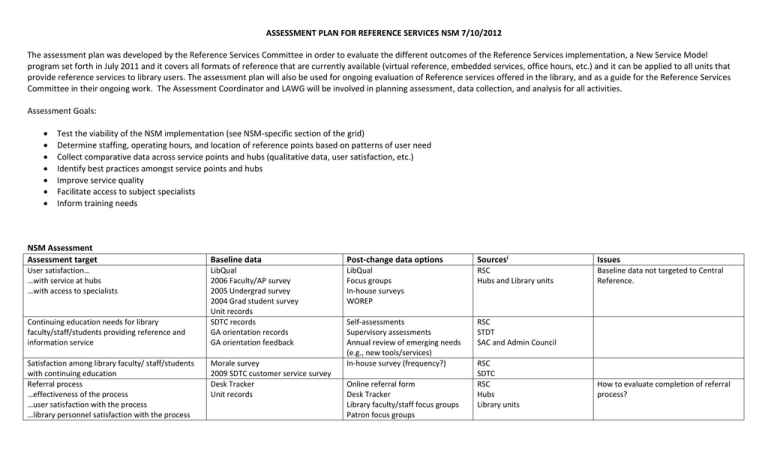
ASSESSMENT PLAN FOR REFERENCE SERVICES NSM 7/10/2012 The assessment plan was developed by the Reference Services Committee in order to evaluate the different outcomes of the Reference Services implementation, a New Service Model program set forth in July 2011 and it covers all formats of reference that are currently available (virtual reference, embedded services, office hours, etc.) and it can be applied to all units that provide reference services to library users. The assessment plan will also be used for ongoing evaluation of Reference services offered in the library, and as a guide for the Reference Services Committee in their ongoing work. The Assessment Coordinator and LAWG will be involved in planning assessment, data collection, and analysis for all activities. Assessment Goals: Test the viability of the NSM implementation (see NSM-specific section of the grid) Determine staffing, operating hours, and location of reference points based on patterns of user need Collect comparative data across service points and hubs (qualitative data, user satisfaction, etc.) Identify best practices amongst service points and hubs Improve service quality Facilitate access to subject specialists Inform training needs NSM Assessment Assessment target User satisfaction… …with service at hubs …with access to specialists Continuing education needs for library faculty/staff/students providing reference and information service Satisfaction among library faculty/ staff/students with continuing education Referral process …effectiveness of the process …user satisfaction with the process …library personnel satisfaction with the process Baseline data Post-change data options Sourcesi Issues LibQual 2006 Faculty/AP survey 2005 Undergrad survey 2004 Grad student survey Unit records SDTC records GA orientation records GA orientation feedback LibQual Focus groups In-house surveys WOREP RSC Hubs and Library units Baseline data not targeted to Central Reference. Self-assessments Supervisory assessments Annual review of emerging needs (e.g., new tools/services) In-house survey (frequency?) RSC STDT SAC and Admin Council Morale survey 2009 SDTC customer service survey Desk Tracker Unit records Online referral form Desk Tracker Library faculty/staff focus groups Patron focus groups RSC SDTC RSC Hubs Library units How to evaluate completion of referral process? ASSESSMENT PLAN FOR REFERENCE SERVICES NSM 7/10/2012 Ongoing Assessment of Reference Services Assessment target Baseline data Post-change data options Who Initial training /orientation needs for newly hired staff GA Orientation records Service provider satisfaction with consolidated public service points (hubs) …serving as well as previous model? …meeting unit needs (hubs and others)? Library personnel (all levels) satisfaction with referral process Unit records Specialists records 2009 SDTC customer service survey Morale survey Unit records and procedures Specialists records Self-assessments Supervisory assessments (as people are hired) Survey Focus groups RSC Hubs and Library units SDTC RSC Hubs and Library Units Subject specialists Qualitative survey of referrals from referral database Focus groups RSC Hubs and library units Subject specialists Robustness of expertise within the library; i.e., number of people capable handling (most or many) questions in a given specialty. Identify gaps in knowledge or training Recommend standard minimum Desk Tracker implementation Conduct of reference service interactions (face-toface or digital) at hubs, in outlying units, and direct to specialists for accuracy, adherence to best practices outlined in the literature. Mode of service employed by users to access hubs Subject specialist lists (historical) Referral database RSC Hubs and Library units READ Scale RSC Hubs and Library units RSC SAC and Admin Council Many variations in fields used May be using same fields differently Need standard method for complaint tracking RSC Hubs RSC Hubs and Library units Subject specialists RSC Hubs and Library units RSC HR SAC and Admin Council Lack of standardized data collection in Desk Tracker Lack of standardized data collection in Desk Tracker Mode of service employed by users to access specialists Type, content, and complexity of questions asked through available services Alignment of available human resources with reference and information service needs Bob Burger’s study Unit records Admin records WOREP Complaint tracking “Secret shopper” Desk Tracker Unit records Desk Tracker Unit records Desk Tracker Analytics on website Desk Tracker Referral Database Desk Tracker, READ Scale Desk Tracker, READ Scale Desk Tracker Unit records Desk Tracker Issues Relies on self reporting of satisfaction with old model for comparison ASSESSMENT PLAN FOR REFERENCE SERVICES NSM 7/10/2012 Assessment target Baseline data Post-change data options Who Alignment of technology tools with reference and information service needs Clickthroughs to/from SFX, Easy Search, Primo, etc. IM Collaborator logs Desk Tracker Clickthroughs to/from SFX, EasySearch, Primo, etc. IM Collaborator logs Desk Tracker Computer-generated searches Easy search management team (ESMT) ESMT Primo? RSC CAPT IT Acquisitions (vendor use data) SAC and Admin Council ESMT Use of electronic reference resources Click through data Same Issues Would this work on Primo Can this metric be expanded to other services? ? Glossary CAPT – Content Access Policy and Technology http://www.library.illinois.edu/committee/capt/charge.html GA – Graduate Assistants HR – University Library Human Resources http://www.library.illinois.edu/administration/human/ IT – University Library Office of Information Technology Planning and Policy http://www.library.illinois.edu/administration/it/index.html LAWG – Library Assessment Working Group http://www.library.illinois.edu/assessment/lawg.html READ Scale – Reference Effort Assessment Data Scale http://www.library.illinois.edu/assessment/readscale.html RSC – Reference Services Committee http://www.library.illinois.edu/committee/ReferenceServices/ReferenceServicesCommitteeCharge.html SAC – Services Advisory Committee http://www.library.illinois.edu/committee/advise/charge.html SDTC – Staff Development and Training Committee http://www.library.illinois.edu/committee/staffdevelop/charge.html WOREP – Wisconsin-Ohio Reference Evaluation Program http://worep.library.kent.edu/ i Named groups may provide data, analyze data, and/or make recommendations. The role of SAC and Admin Council will be advisory in the planning process, and they are also key stakeholders who may make recommendations for action.
